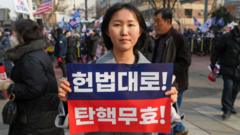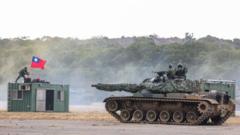As Okinawa grapples with the persistent U.S. military presence, voices of dissent echo against war legacies and colonialism, while younger generations express anxieties over regional security threats, particularly from China.
Okinawa: A Historical Tug-of-War Amidst Modern Threats

Okinawa: A Historical Tug-of-War Amidst Modern Threats
The residents of Okinawa navigate a complex legacy of U.S. military presence, balancing historical grievances with contemporary geopolitical concerns regarding China.
Okinawa, a small island in Japan, finds itself at the center of a multifaceted geopolitical struggle, shaped significantly by its historical relationship with both the United States and Japan. This narrative emerges amid ongoing tensions sparked by China's growing influence in the region.
Local residents have expressed their feelings toward U.S. military bases, viewing them as enduring reminders of war and colonial dynamics. Keiko Itokazu, a 77-year-old resident, recalls a tragic incident from her youth in 1965, where a military drop gone awry led to the death of a young girl in her community. This event catalyzed her long-standing opposition to the military presence that began in 1945 when U.S. forces captured the island during World War II.
Despite Okinawa being returned to Japanese control in 1972, frustrations linger as many locals perceive themselves as second-class citizens. This perception stems from historical grievances dating back to the late 19th century when Okinawa was annexed by Japan, ending its status as an independent kingdom known as the Ryukyu Kingdom.
Protests continue today, particularly aimed at new developments like the U.S. Marine airfield being constructed in northern Okinawa. The events reflect a profound disconnect between the Okinawan populace's desires for peace and independence and the strategic military interests of greater powers.
Simultaneously, younger generations are beginning to voice concerns over security threats from China, complicating the existing narratives. Although the older residents emphasize historical injustices, these younger voices highlight the necessity of a military presence for potential defense against hostile movements in the region.
The juxtaposition of these perspectives reveals that Okinawa's situation is not just about military bases or historical legacies; it is also about the dynamic interplay of national identity, security, and the tensions of living in a hotspot of international power struggles. As they navigate these complex realities, Okinawans remain hopeful for a future where their voices are heard and their needs prioritized amidst global ambitions.





















